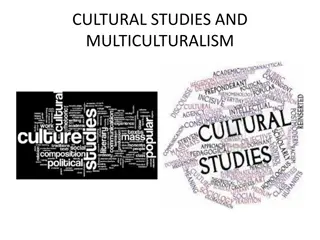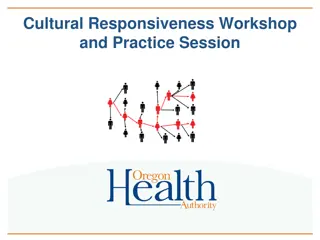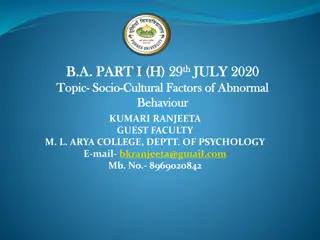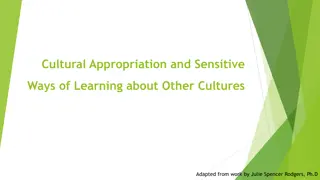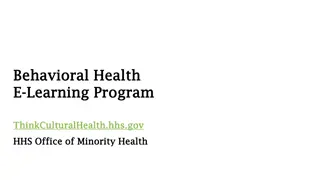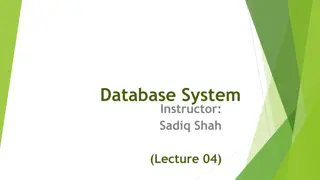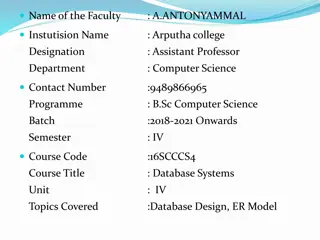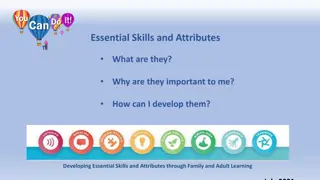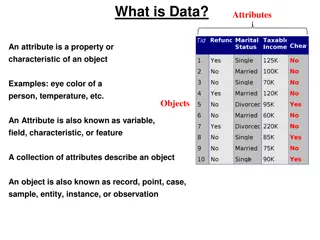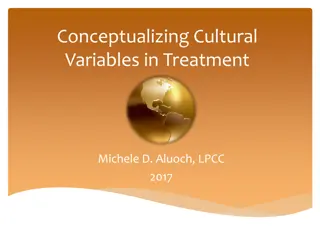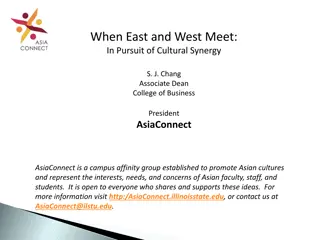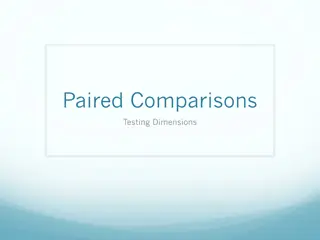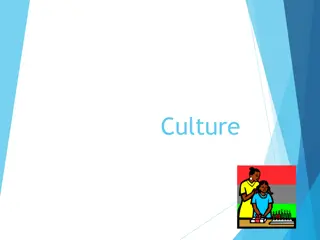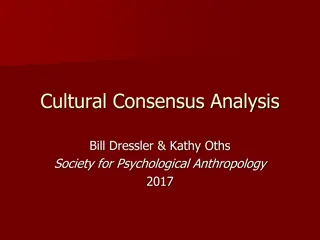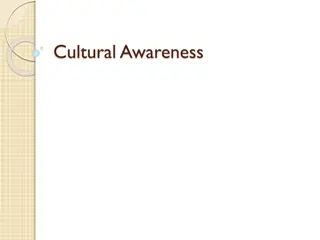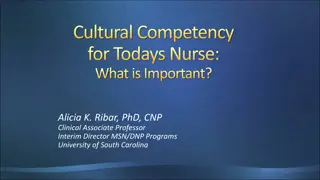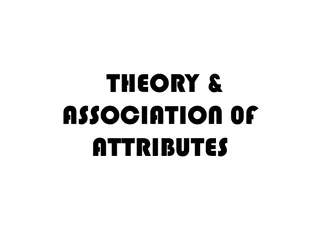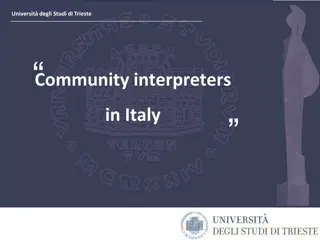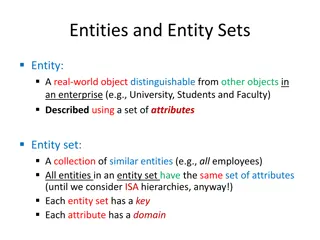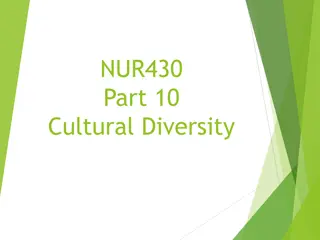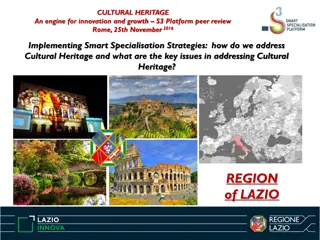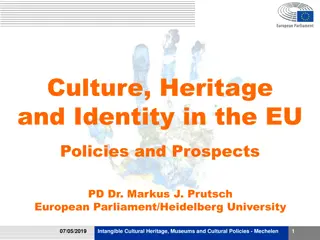Understanding Design Tactics and Quality Attributes
Quality attributes play a crucial role in system design by indicating how well a system meets stakeholder needs. Architecturally Significant Requirements (ASRs) have a profound impact on system architecture. Quality attributes can be operational (availability, reliability) or developmental (modifiab
2 views • 28 slides
Exploring Cultural Studies and Multiculturalism
Cultural studies is an interdisciplinary field that examines cultural differences while aiming to create a shared culture where diversity is respected. It challenges traditional views by studying all cultural productions and their societal contexts. Stuart Hall's work further delves into different p
0 views • 18 slides
Enhancing Short-Term Mission Effectiveness Through Cultural Anthropology Insights
Utilizing insights from cultural anthropology, this presentation delves into defining culture for short-term missions, viewing culture in successive levels, and key concepts such as cultural evolution and relativity. It explores the impact of culture on individuals and missions, emphasizing the impo
0 views • 16 slides
Exploring Cultural Responsiveness Through Workshops & Practice Sessions
This content provides a comprehensive guide on cultural responsiveness through workshops and practice sessions. It covers topics like cultural sensitivity, biases identification, and ways to reduce implicit biases. Resources, videos, and insights on cultural knowledge and awareness are shared to pro
0 views • 19 slides
Understanding Entity-Relationship Model in Database Systems
This article explores the Entity-Relationship (ER) model in database systems, covering topics like database design, ER model components, entities, attributes, key attributes, composite attributes, and multivalued attributes. The ER model provides a high-level data model to define data elements and r
0 views • 25 slides
Critics and Defenders in Multiculturalism Debate
Critics of multiculturalism argue that its focus on cultural inequalities diverts attention from socio-economic issues, while defenders like Kymlicka advocate for balancing cultural recognition with equal rights. Feminist critics raise concerns about cultural support for individual self-respect, par
0 views • 9 slides
Understanding Socio-Cultural Factors of Abnormal Behavior in Psychology
Exploring the impact of socio-cultural factors on abnormal behavior, this article delves into the influence of societal pressures, cultural norms, and economic status on mental health. The socio-cultural model emphasizes how societal criteria shape perceptions of abnormality, highlighting the role o
0 views • 7 slides
Understanding Cultural Appropriation and Respectful Cultural Learning
This content delves into the concept of cultural appropriation, offering definitions, examples, and ways to avoid it. It emphasizes the importance of cultural appreciation and outlines the differences between appropriation and appreciation, highlighting the power dynamics involved. Readers gain insi
1 views • 16 slides
Enhancing Cultural Competency in Behavioral Health Professionals
This e-learning program, developed by the HHS Office of Minority Health, focuses on improving cultural competence for behavioral health providers. It covers topics such as the connection between culture and behavioral health, the impact of cultural identity on client interactions, and strategies to
0 views • 9 slides
Understanding Modeling Entities and Attributes in Database Systems
Entities, relationships, and attributes are fundamental constructs in the Entity-Relationship (E-R) model. Entities represent people, places, objects, events, or concepts in a user environment. Each entity type has a set of attributes defining its properties. It is crucial to distinguish between ent
2 views • 17 slides
Understanding Entity-Relationship Modeling in Database Systems
Entity-Relationship (ER) modeling is a crucial aspect of designing database systems. It helps in defining data elements and relationships, presenting a conceptual view of the database structure. Entities, attributes, key attributes, composite attributes, and multivalued attributes play distinct role
1 views • 33 slides
Developing Essential Skills and Attributes for Success
Essential skills encompass basic, vocational, and transferable skills necessary for everyday life and any job. Attributes like confidence, tolerance, independence, and resilience are equally vital. Employers value skills such as problem-solving, goal-setting, teamwork, and communication. Developing
1 views • 11 slides
Louisiana Cultural Districts: Engaging Communities in Cultural Development
The Louisiana Cultural Districts program, under the Cultural Economy Initiative, aims to revitalize local communities by creating hubs of cultural activity. By building on cultural resources and promoting art and culture, the program benefits from increased occupancy, commerce, and community identit
2 views • 18 slides
Understanding Data Attributes and Types for Analysis
Exploring the concept of data attributes, this information covers attributes as properties of objects, the distinction between experimental and observational data, types of attributes like qualitative and quantitative, and the properties of attribute values. It also delves into examples and categori
2 views • 32 slides
Understanding HTML Image Tags and Attributes
Delve into the world of HTML image tags and attributes with this detailed overview. Learn how to display images, make them clickable links, adjust image sizes, and utilize various attributes for styling and alignment. Discover the differences between image formats such as GIF and JPEG, and master th
1 views • 32 slides
Understanding Cultural Variables in Treatment: A Multicultural Perspective
This content explores the significance of cultural variables in treatment, emphasizing the importance of multicultural competence for counselors. It covers defining multicultural aspects, key personality attributes for multicultural competency, risks of lacking multicultural competence, and differen
0 views • 212 slides
Understanding Object-Oriented Programming (OOP) in Python
Object-Oriented Programming (OOP) is a programming paradigm that focuses on organizing code into objects with attributes and behaviors. Python supports various OOP concepts such as classes, objects, inheritance, polymorphism, abstraction, and encapsulation. Classes serve as blueprints for creating o
0 views • 29 slides
Modelling and Optimization of Quality Attributes in Software Variability
Modelling and multi-objective optimization of quality attributes in variability-rich software is crucial for customizing software functionality to meet stakeholders' diverse needs. This involves addressing conflicting quality requirements such as cost, reliability, performance, and binary footprint
0 views • 34 slides
Cultural Economic Development Policy in Hackney and Lewisham: A Comparative Study
Building on previous research in Massachusetts, this project focuses on examining local government initiatives in cultural economic development in London boroughs of Lewisham and Hackney. The study explores the role of government in enhancing the cultural and creative industries, aiming to contribut
0 views • 7 slides
Bridging East and West: Cultivating Cultural Understanding
Exploring the complexities and nuances of cultural differences between the East and the West, this article delves into the challenges of cultural synergy and the importance of fostering multicultural understanding. Highlighting the need for effective communication and empathy across cultures, it pre
0 views • 18 slides
Exploring Paired Comparisons Testing Dimensions in Cultural Domains
Studying attributes in cultural domains involves various methods like free listing, pile sorts, and triad tests. Rating scales and paired comparisons are used to evaluate items based on attributes. Paired comparisons produce rank-ordered lists and can be done effectively with tools like Anthopac, en
0 views • 11 slides
Understanding Property Fitting Analysis Using PROFIT Method
Property Fitting Analysis, with the use of the PROFIT method, evaluates the correlation between item attributes and their locations in a multidimensional space. It helps test theories on how people perceive similarities among items in a cultural domain by analyzing MDS graphics, clusters, and dimens
0 views • 29 slides
Understanding Cultural Diversity in Healthcare
The content explores the significance of cultural diversity in healthcare, emphasizing the increasing diversity of the population in the United States and the importance of cultural competence in nursing. It delves into cultural concepts, transcultural nursing, cultural context of health and caring,
0 views • 13 slides
Update of Medium- and Heavy-Duty Vehicle Attributes for Energy Commission Transportation Forecasting
This project aims to support the Energy Commission's transportation energy demand forecasting efforts by updating historic and forecast attributes of medium- and heavy-duty vehicles. Tasks include administration, review of past forecast attributes, updating historical vehicle attributes, forecasting
0 views • 12 slides
Medium and Heavy-Duty Vehicle Attributes for Energy Commission Forecasting
This project aims to update historic and forecast attributes of medium and heavy-duty vehicles to support Energy Commission transportation energy demand forecasting efforts. Tasks include reviewing forecast attributes, updating vehicle technology forecasts, and forecasting ZEV and low-NOx fueling/ch
0 views • 20 slides
Understanding Cultural Consensus Analysis in Psychological Anthropology
Explore the essence of Cultural Consensus Analysis (CCA) as a significant aspect of psychological anthropology. Through ethnographic work and structured techniques, CCA helps verify shared knowledge within cultural domains and enhance the comprehension of cultural models. The model and steps involve
0 views • 64 slides
Mapping Project Overview and Attributes
This content provides detailed information about a mapping project involving the transition from S.S-53 to S-124, including complex and simple attributes, spatial references, and metadata. It covers aspects such as domain models, NAVWARN preamble, complex vs. simple attributes, and more. The content
0 views • 23 slides
Understanding Cultural Awareness and Diversity in the United States
Explore the significance of cultural awareness, including definitions of culture, cultural groups, and subcultures. Learn about the diversity in the United States based on national origins, beliefs, customs, and shared characteristics. Discover how to interact positively with individuals from differ
0 views • 37 slides
Attributes of Good and Expert Auditors Exploration
This session explores the attributes that distinguish GOOD and EXPERT auditors, allowing participants to rank their importance. A comparison with a U.S. study will be conducted, and a catchphrase identifying essential auditor traits will be developed. Attributes such as creativity, judgment, knowled
0 views • 14 slides
Development and Application of Cultural Policy Typology for Arts and Culture
This research focuses on presenting a cultural policy typology based on goal variation and examining its application in a U.S. state art/cultural agency, specifically the Massachusetts Cultural Council. The study delves into the policy goals of the council and highlights the need for a specialized c
0 views • 16 slides
Understanding Cultural Competency in Nursing Today
Explore the importance of cultural competency for nurses today, encompassing the definition of culture, cultural competence, Leininger's Culture Care Theory, and the significance of cultural understanding in nursing. The presentation delves into the role of nurses in promoting health across diverse
0 views • 14 slides
Exploring Cultural Policy in the Mediterranean with a Focus on Malta
Delve into the intricate web of cultural relations in the Mediterranean region, centered around Malta. From historical and political insights to postcolonial influences and the role of cultural policy, this exploration sheds light on the complexities and nuances shaping the cultural landscape. Disco
0 views • 23 slides
Understanding Theory and Association of Attributes
Attributes are studied under Theory of Attributes and Association of Attributes. Theory of Attributes covers basic concepts like statistics of variables, while Statistics of Attributes deals with qualitative data that can't be measured quantitatively. Conditions and classifications with reference to
0 views • 27 slides
Community Interpreting and Cultural Mediation in Italy: Insights from the University of Trieste
University of Trieste sheds light on the roles and qualifications of cultural mediators in Italy. The profession, categorized into linguistic and cultural mediation, plays a vital role in facilitating relationships between authorities and foreign residents, promoting integration, and dismantling lan
0 views • 9 slides
Gender, Identity, and Art Therapy: Exploring Cultural Attributes and Gender Mainstreaming
Delve into the complexities of gender, identity, and their impact on art therapy through the lens of cultural attributes, gender mainstreaming, and the work lives of art therapists. Dr. Caryl Sibbett provides insights and reflections on how issues related to gender manifest in the field of art thera
0 views • 52 slides
Understanding the Art Bonus Tax Credit for Cultural Support
The Art Bonus tax credit in Italy encourages individuals and businesses to support cultural heritage through charitable donations, providing a tax credit of 65%. This initiative aims to not only fund cultural institutions but also strengthen the bond between citizens and their heritage, driving soci
0 views • 10 slides
Understanding Entities and Relationships in Database Design
Explore the concepts of entities, entity sets, attributes, key attributes, single-valued and multi-valued attributes, derived attributes, as well as relationships and relationship sets in the context of database design. Gain insights into distinguishing between regular entities, weak entities, and e
0 views • 24 slides
Understanding Cultural Diversity in Nursing Education
Explore essential concepts in transcultural nursing, including Leininger's Transcultural Nursing Theory and other models. Learn about cross-cultural nursing, cultural competence, diversity in nursing practice, and key terms like cultural imposition and acculturation. Enhance your cultural competence
0 views • 32 slides
Cultural Heritage as an Engine for Innovation and Growth in the Region of Lazio
Discussing the significance of cultural heritage in driving innovation and growth in the Region of Lazio, this report highlights the key elements and issues related to smart specialization strategies. It emphasizes the economic impact of tourism and cultural heritage in terms of enterprises, value a
0 views • 19 slides
Cultural Heritage and Identity in EU Policies
Delve into the significance of cultural heritage and identity in European Union policies through a presentation discussing the evolution of heritage, European identity concepts, and EU heritage policies since the 1970s. Explore the intertwined nature of cultural heritage with European integration an
0 views • 11 slides

